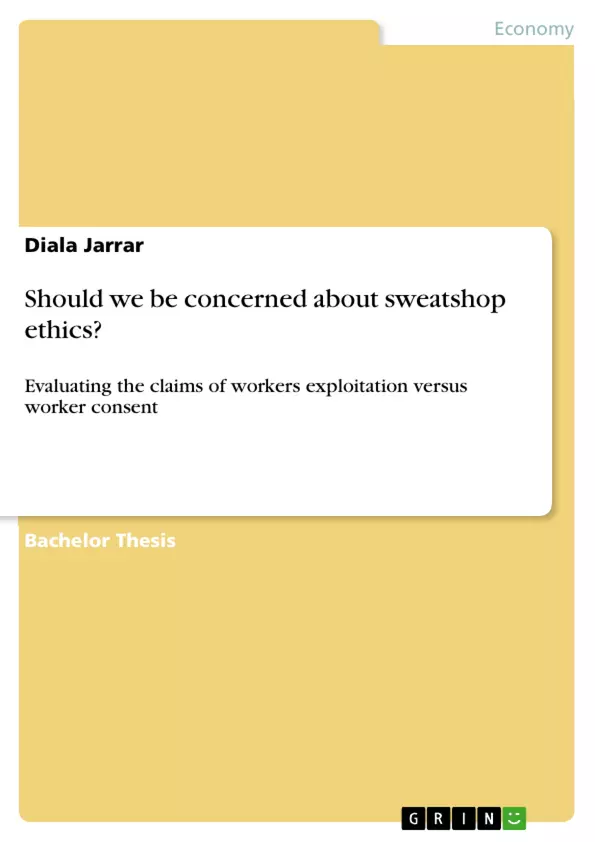
Should we be concerned about sweatshop ethics?
Bachelorarbeit, 2017
36 Seiten, Note: 80.00
Leseprobe
Table of Contents
- Acknowledgement
- Abstract
- Chapter 1:
- Introduction
- Chapter 2:
- Aims and Objectives
- Scope
- Chapter 3:
- Literature Review
- Power of Choice
- Sweatshops- Exploitation or Opportunity
- Hypotheses
- Chapter 4:
- Findings and Analysis
- Results &Discussions
- Chapter 5:
- Conclusion
Objectives and Key Themes
This research paper aims to analyze the ethical issues surrounding sweatshops by exploring the contrasting viewpoints of worker exploitation and worker consent. The study aims to evaluate the moral significance of worker consent, examine the arguments for and against sweatshops, and investigate the influence of moral intensity dimensions, particularly magnitude of consequences and proximity, on individuals' ethical decisions and purchasing patterns related to sweatshops.
- The moral significance of worker consent
- The arguments for and against sweatshops: exploitation versus opportunity
- The role of moral intensity dimensions (magnitude of consequences and proximity) in ethical decision-making
- The impact of ethical concerns on purchasing patterns
- The ethical responsibilities of multinational enterprises (MNEs) in the sweatshop context
Chapter Summaries
Chapter 1: Introduction introduces the ethical dilemma of sweatshops, highlighting the contrasting perspectives on their impact. It emphasizes the importance of studying moral intensity and its influence on ethical decision-making.
Chapter 2: Aims and Objectives outlines the research goals, focusing on evaluating the key ethical issues associated with sweatshops, examining workers' consents against exploitation, and assessing the role of moral intensity dimensions in ethical decision-making.
Chapter 3: Literature Review explores the transformative power of choice, particularly in the context of sweatshop labor. It presents arguments for both the exploitative nature of sweatshops and the opportunity they provide for workers, considering ethical frameworks like Kantian ethics and Utilitarianism.
Chapter 4: Findings and Analysis examines the data collected from a focus group, exploring the correlation between magnitude of consequences and purchasing patterns, and the inverse correlation between proximity and purchasing behaviors.
Chapter 5: Conclusion summarizes the findings, suggesting that while sweatshops might not be entirely ethical, their abolition could lead to worse outcomes for workers. It highlights the need for government oversight and responsible media portrayals to address the ethical concerns surrounding sweatshops.
Keywords
Sweatshops, ethics, worker consent, worker exploitation, moral intensity, magnitude of consequences, proximity, purchasing patterns, multinational enterprises (MNEs), Kantian ethics, Utilitarianism, autonomy, freedom of choice, poverty, development, media framing, ethical decision-making.
Frequently Asked Questions
Are sweatshops ethically justifiable if workers consent to them?
The research explores whether worker consent is truly voluntary or a result of limited choices. While MNEs argue consent makes them ethical, critics point to the exploitative nature of the conditions.
Do sweatshops provide any benefits to the workers?
Yes, they often provide employment for people in poverty, potentially improving their standards of living and providing an escape from a poverty wage spiral compared to other local alternatives.
What is the role of moral intensity in consumer behavior?
Moral intensity dimensions, such as the magnitude of consequences and proximity, significantly influence how individuals make ethical decisions and their subsequent purchasing patterns.
What would happen if sweatshops were completely abolished?
The study suggests that complete abolition might lead to worse outcomes for the workers, such as unemployment, highlighting the need for regulation rather than just closure.
What are the ethical responsibilities of multinational enterprises (MNEs)?
MNEs are challenged to balance profit with ethical standards, ensuring that worker autonomy is respected and that harmful conditions are addressed through oversight and transparency.
Details
- Titel
- Should we be concerned about sweatshop ethics?
- Untertitel
- Evaluating the claims of workers exploitation versus worker consent
- Hochschule
- University of Brighton (Business School)
- Veranstaltung
- Business Ethics
- Note
- 80.00
- Autor
- Diala Jarrar (Autor:in)
- Erscheinungsjahr
- 2017
- Seiten
- 36
- Katalognummer
- V938371
- ISBN (eBook)
- 9783346269942
- ISBN (Buch)
- 9783346269959
- Sprache
- Englisch
- Schlagworte
- should evaluating
- Produktsicherheit
- GRIN Publishing GmbH
- Preis (Ebook)
- US$ 18,99
- Preis (Book)
- US$ 20,99
- Arbeit zitieren
- Diala Jarrar (Autor:in), 2017, Should we be concerned about sweatshop ethics?, München, Page::Imprint:: GRINVerlagOHG, https://www.diplomarbeiten24.de/document/938371
- Autor werden
- Ihre Optionen
- Vertriebskanäle
- Premium Services
- Autorenprofil
- Textarten und Formate
- Services für Verlage, Hochschulen, Unternehmen

- © GRIN Publishing GmbH.
- Alle Inhalte urheberrechtlich geschützt. Kopieren und verbreiten untersagt.
- info@grin.com
- AGB
- Open Publishing
Der GRIN Verlag hat sich seit 1998 auf die Veröffentlichung akademischer eBooks und Bücher spezialisiert. Der GRIN Verlag steht damit als erstes Unternehmen für User Generated Quality Content. Die Verlagsseiten GRIN.com, Hausarbeiten.de und Diplomarbeiten24 bieten für Hochschullehrer, Absolventen und Studenten die ideale Plattform, wissenschaftliche Texte wie Hausarbeiten, Referate, Bachelorarbeiten, Masterarbeiten, Diplomarbeiten, Dissertationen und wissenschaftliche Aufsätze einem breiten Publikum zu präsentieren.
Kostenfreie Veröffentlichung: Hausarbeit, Bachelorarbeit, Diplomarbeit, Dissertation, Masterarbeit, Interpretation oder Referat jetzt veröffentlichen!
- GRIN Verlag GmbH
-
- Nymphenburger Str. 86
- 80636
- Munich, Deutschland
- +49 89-550559-0
- +49 89-550559-10
- info@grin.com
-









